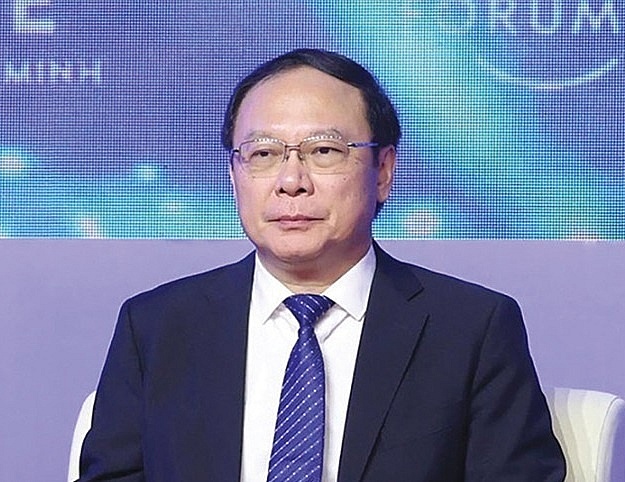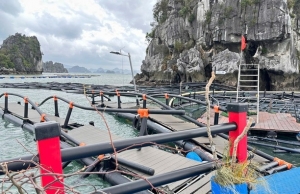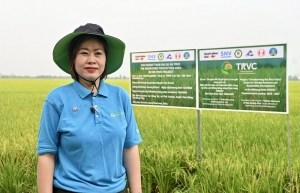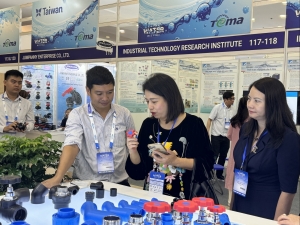Concerted efforts to address climate change
Shortly after joining in 1994, Vietnam implemented a programme on gradual elimination of ozone-depleting substances and established the National Programme Office to coordinate and implement activities to eliminate substances controlled under the Montreal Protocol.
 |
| Le Cong Thanh, deputy Minister of Natural Resources and Environment |
During the first decade of participation, Vietnam began to develop and issue regulations to manage and control the use of ozone-depleting substances, while also supporting businesses in technology transition to eliminate these substances.
From 2004 until 2014, Vietnam strengthened its efforts to protect the ozone layer and issued numerous management regulations and directives to oversee the import and export of these substances; control the use of CFC (chlorofluorocarbon) refrigerants; and limit the establishment or expansion of production by businesses using HCFC, a class of ozone-depleting substances used as refrigerants and in semiconductor manufacturing.
Alongside other countries in the region, Vietnam fulfilled its obligations to eliminate the consumption of CFCs, halons, and chlortetracycline from 2010, halted the consumption of HCFCs at baseline levels from 2013, and undertook numerous initiatives to support businesses in technology transition.
Since that time, Vietnam has focused on perfecting its institutional framework and policies; to date, the policy and legal system regarding ozone protection and the management and elimination of ozone-depleting substances and greenhouse gases (GHGs) has been fundamentally completed.
Manufacturers of foam, air conditioning, and refrigeration equipment no longer use ozone-depleting substances in their production; imports and consumption of controlled substances follow a designated timeline; and methyl bromide is restricted to quarantine and sterilisation purposes in agriculture.
In 2019, the government approved participation in the Kigali Amendment to the Montreal Protocol, aimed at strengthening the management of GHGs used to replace ozone-depleting substances that are being phased out. The protection of the ozone layer has been enshrined in the Environmental Protection Law, and various decrees, circulars, standards, and national technical regulations have been issued to aid in management efforts.
After 30 years of participation in this endeavour, Vietnam has been internationally recognised as an active and highly responsible member, undertaking numerous tasks and solutions to manage and eliminate ozone-depleting substances and GHGs, achieving significant results. According to statistics and assessments from the International Ozone Secretariat published in July, Vietnam has eliminated the equivalent of 220 million tonnes of CO2 since its participation.
The achievements over the years are significantly attributed to various ministries as well as the active participation of training institutions, associations, and businesses nationwide. This goes alongside the support and collaboration of the International Ozone Secretariat, the Multilateral Fund for the Implementation of the Montreal Protocol, and international organisations such as the United Nations Environment Programme, the United Nations Development Programme, and the World Bank.
In June 2024, the prime minister issued the national plan for the management and elimination of controlled ozone-depleting substances and GHGs. If the roadmap is followed, by 2045, Vietnam will reduce emissions by over 11 million tonnes of carbon, contributing to the goal of achieving net-zero emissions by 2050.
To continue effectively implementing this and the commitments that Vietnam has entered, we need to undertake various activities. Firstly, Vietnam must continue to refine the institutional framework and policies regarding the management and elimination of controlled substances, issuing standards, regulations, and technical guidelines.
It will also have to strengthen inter-agency cooperation in inspecting and monitoring the enforcement of laws, and enhance controls over the import and export of controlled substances, with the roles of import-export management agencies, market management, and customs being particularly important.
Secondly, Vietnam should support and encourage activities that promote the transition to climate-friendly technologies, improve the energy efficiency of cooling equipment; promote the collection, recycling, reuse, and treatment of substances controlled under the Montreal Protocol; and implement sustainable cooling technology models and cooling services in urban areas, residential areas, office buildings, commercial spaces, and public works.
Finally, Vietnam has to implement programmes to enhance capacity for managing and eliminating controlled substances for law enforcement officials, trainers at educational institutions, and personnel at skill assessment organisations.
 | Climate change and natural disasters threaten aquaculture industry Climate change, natural disasters, and rising input costs in the latter half of this year are making it difficult for the aquaculture industry to reach its $9.5 billion target set for 2024. |
 | A rice value chain that can address climate change Following the first summer-autumn rice crop in three key Mekong Delta provinces, Tran Thu Ha, director of a project to transform the rice value chain to be more climate resilient, told VIR’s Oanh Do about the commitment from the SNV Netherlands Development Organisation to continue scaling up the model to help Vietnam craft a sustainable rice value chain. |
 | Vietnam Water Week 2024 attracts 150 booths from 15 countries Vietnam Water Week 2024 has attracted 150 pavilions displaying advanced and smart materials, equipment, and technology from 15 countries. |
What the stars mean:
★ Poor ★ ★ Promising ★★★ Good ★★★★ Very good ★★★★★ Exceptional
 Tag:
Tag:
Related Contents
Latest News
More News
- Trung Nam-Sideros River consortium wins bid for LNG venture (January 30, 2026 | 11:16)
- Vietnam moves towards market-based fuel management with E10 rollout (January 30, 2026 | 11:10)
- Envision Energy, REE Group partner on 128MW wind projects (January 30, 2026 | 10:58)
- Vingroup consults on carbon credits for electric vehicle charging network (January 28, 2026 | 11:04)
- Bac Ai Pumped Storage Hydropower Plant to enter peak construction phase (January 27, 2026 | 08:00)
- ASEAN could scale up sustainable aviation fuel by 2050 (January 24, 2026 | 10:19)
- 64,000 hectares of sea allocated for offshore wind surveys (January 22, 2026 | 20:23)
- EVN secures financing for Quang Trach II LNG power plant (January 17, 2026 | 15:55)
- PC1 teams up with DENZAI on regional wind projects (January 16, 2026 | 21:18)
- Innovation and ESG practices drive green transition in the digital era (January 16, 2026 | 16:51)






















 Mobile Version
Mobile Version